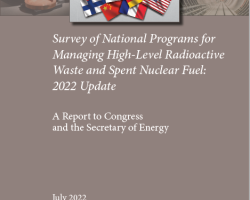Category of Content
Siting Experience Documents Only
Publication Date
Subject Matter
Keywords
Transportation Planning: Indigenous Dialogue
Transportation Planning: Indigenous Dialogue
In 2019, the NWMO commissioned Maawandoon Inc to lead Indigenous Dialogue session to support NWMO’s transportation planning for the long-term care of Canada’s used nuclear fuel. This research built upon and complemented public attitude research carried out in 2017 and 2018. The research methodology consisted of 7 Indigenous dialogue sessions and attendance at 3 Indigenous Annual General Assemblies (AGA)/meetings with dialogue components.
Investigation of Nuclide Importance to Functional Requirements Related to Transport and Long-Term Storage of LWR Spent Fuel
Investigation of Nuclide Importance to Functional Requirements Related to Transport and Long-Term Storage of LWR Spent Fuel
Criticality Consequence Calculation Involving Intact PWR MOX SNF in a Degraded 21 PWR Assembly Waste Package
Criticality Consequence Calculation Involving Intact PWR MOX SNF in a Degraded 21 PWR Assembly Waste Package
Criticality Consequence Analysis Involving Intact PWR SNF in a Degraded 21 PWR Assembly Waste Package
Criticality Consequence Analysis Involving Intact PWR SNF in a Degraded 21 PWR Assembly Waste Package
Intact and Degraded Mode Criticality Calculations for the Codisposal of ATR Spent Nuclear Fuel in a Waste Package
Intact and Degraded Mode Criticality Calculations for the Codisposal of ATR Spent Nuclear Fuel in a Waste Package
Application of Sensitivity/Uncertainty Methods to Burnup Credit Criticality Validation
Application of Sensitivity/Uncertainty Methods to Burnup Credit Criticality Validation
OECD/NEA Burnup Credit Criticality Benchmark, Analysis of Phase II-B Results: Conceptual PWR Spent Fuel Transportation Cask
OECD/NEA Burnup Credit Criticality Benchmark, Analysis of Phase II-B Results: Conceptual PWR Spent Fuel Transportation Cask
Research Supporting Implementation of Burnup Credit in the Criticality Safety Assessment of Transport and Storage Casks
Research Supporting Implementation of Burnup Credit in the Criticality Safety Assessment of Transport and Storage Casks
Radiolytic Specie Generation from Internal Waste Package Criticality
Radiolytic Specie Generation from Internal Waste Package Criticality
Intact and Degrade Mode Criticality Calculations for the Codisposal of TMI-2 Spent Nuclear Fuel in a Waste Package
Intact and Degrade Mode Criticality Calculations for the Codisposal of TMI-2 Spent Nuclear Fuel in a Waste Package
SCALE-4 Analysis of Pressurized Water Reactor Critical Configurations: Volume 3-Surry Unit 1 Cycle 2
SCALE-4 Analysis of Pressurized Water Reactor Critical Configurations: Volume 3-Surry Unit 1 Cycle 2
Probabilistic External Criticality Evaluation
Probabilistic External Criticality Evaluation
The Likelihood of Criticality Following Disposal of SF/HLW/HEU/Pu
The Likelihood of Criticality Following Disposal of SF/HLW/HEU/Pu
Supplement to the Disposal Criticality Analysis Methodology
Supplement to the Disposal Criticality Analysis Methodology
Screening Analysis of Criticality Features, Events, and Processes for License Application
Screening Analysis of Criticality Features, Events, and Processes for License Application
Survey of National Programs for Managing High-Level Radioactive Waste and Spent Nuclear Fuel: 2022 Update
Survey of National Programs for Managing High-Level Radioactive Waste and Spent Nuclear Fuel: 2022 Update
In October 2009, the U.S. Nuclear Waste Technical Review Board (Board or NWTRB) published Survey of National Programs for Managing High-Level Radioactive Waste and Spent Nuclear Fuel. For each of the 13 national programs studied, the report catalogued 15 institutional arrangements that had been set in place and 15 technical approaches that had been taken to design repository systems for the long-term management of high-activity radioactive waste.

